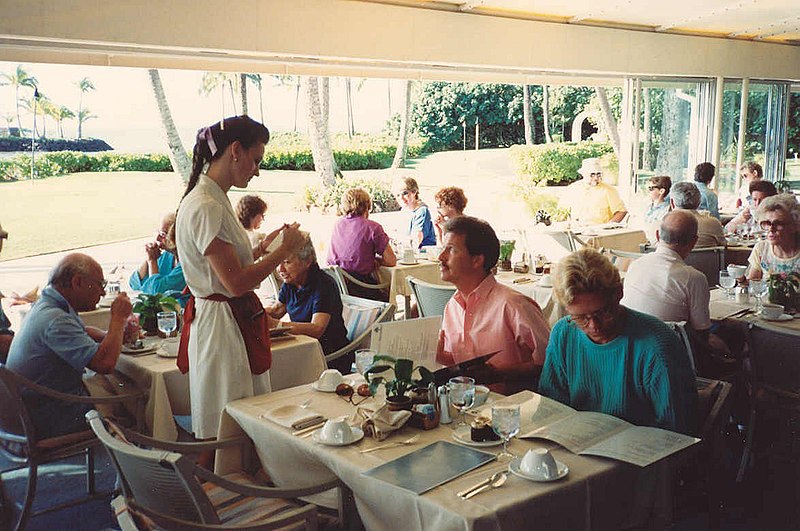“They gave my job away,” she said, right when we entered the Meat and Malt restaurant—our waitress, no, hostess, informed us. “They took my job and gave it to the machine,” she said, gesturing to a line of touch-screen computers with brightly colored images and text that my mother’s adopted grandmother couldn’t read. Maybe you’ve seen self-checkout machines. My father, God bless him, refuses to use them on principle, while I, to my misfortune, as a typical millenial—mea culpa, mea culpa, mea maxima culpa—find myself too adept in the machine world, or too mastered by it and its love of convenience, to avoid them entirely.
But those self-checkout machines are no longer simply in a line at the local grocery store’s express lane, where cashiers are still an option, trained for high-traffic check-outs from grocery carts as my mother was during her college days. Now they stand in a fast-food restaurant near you, a McDonald’s, Jack-in-the-Box, or the Taco John’s in Porterville. As much as we try to shop local, putting forward effort and efectivo (as they call cash in Spanish), in some small towns what survives are the chain restaurants that a corporate mothership has deployed here in the boonies. Even in larger towns like my own Irving, TX, in the midst of the DFW metroplex, regional chains like Whataburger and Waffle House (as Peter Lawler reminded us in his encomium some twelve years ago) provide hubs for small communities, mostly of older retirees whose fixed incomes make the cheap-yet-delicious fare a regular Babette’s feast around which to gather and gab. It was at the former that I once heard a hysterical conspiracy theory—“you hear Michelle’s a man?”—and the latter the place to which my college friends kidnapped me the morning of my 21st birthday, almost allowed to open a clandestine bottle of champagne for mimosas until a manager mindful of the law told us they had no liquor license.
So Lawler’s point—that such places are, at least at certain times of day or night, “a classless society,” full of college students and “mostly lower-middle class people, people who work with their hands”—stands. If we would care for our small townships as they are, the corporate restaurant, its regime, and its animating ideas, are of our concern also. We were a short few hours away from the Athens of the South, but even in the villages, the summer home of Cephalus, the corporations have carried in the machines to order (for) us. “It might make sense for the big city, but we’re a retirement town,” my hostess told me. “A number of the young people like it, but the old people. . . we have lost some regulars over it. I try to explain the machines to them, but some of them just don’t like it. We had one guy come in, and when he saw them, he said, ‘I curse this place!’ and waved his cane around his head. ‘I’m sahwry, sir.’ ‘I curse this place!’ he said again.” ‘I’m sahwry,’” she said in a drawl that television would have you believe is either dead or dying with the old folks who live here.
The young no longer care for their fathers or their father’s ways, turning aside to novel hedonism and disdain—such is the rhetoric of the old encountering civic decline, from Athens to Rome to La Ville Lumièr, doubtless expressing a true sentiment pertaining to at least a partial reality. But Eve hastened about the restaurant between customers—or should we say guests—and various chores of her job as if an old-time maiden hastening through the hill country to her elder Elizabeth. When I first stopped her to chat, upon receiving the milkshake that my adopted great-grandmother urged me to order, I had felt bad, thinking her busy. “No, I’m not too busy, I just walk fast,” she responded. Being a hostess now, not a waitress, she wasn’t supposed to go past the counter, but just call us when our food was ready, but she still brought it out anyhow. “I miss some of the personal touch otherwise,” she said. “They do get on us for staying too much in the back and want us to be out front more.” It’s hard to imagine her being more involved in the work of hospitality, seeing her welcome each group of guests, patiently usher them to her computer counterparts, and serve as the go-between for the older and younger children of Adam. Electronic as the latter crowd is, they often fail to communicate with their organic elders.
What is the solution, then, to this so-called solution to the problem of persons and paying them just wages? One might think that by consolidating the functions of the restaurant into fewer human hands, those hands might receive a greater share of the harvest—and there’s some truth here, but only some. “I make a bit more hourly now,” she said, “but less in tips than I used to. Some regulars would tip $20 but they don’t come around anymore.” To clarify the final prompt the machine gave me, suggesting I contribute a tip to the staff (exclusive of the management), she added, “those tips go to the kitchen staff, not me. I always just tell people if they want to tip, cash is best.” Cash, that paper grain that eludes the Machine’s eye and the slippery fingers of its spreadsheets.
Should we then, with an American punk band, rage against the machine? Examining the political activities of that group (a task for another day) suggests that to the extent that we are overcome with rage, the cool logic of the machine will overtake and retask us, supporting, for instance, the killing of unborn children so that their mothers can continue to work in the corporate widget factory, all, putatively, in the name of freedom. It’s not perhaps that the world doesn’t need change, but that as anti-Machine author Paul Kingsnorth put it in these pages, “the first work is changing yourself.” We have to live where we’re placed, and for Eve at the Meat and Malt, right now that means continuing to serve the guests who entreat her for sustenance, despite the intrusion of the impersonal into her hospitality.
Some would say that, were we to count this among the injustices of our day, a solution demands more. I once became acquainted with an academic, a northerner, who I’m told wrote a book on Southern hospitality alleging its complicity—you guessed it—with “white privilege” and “systemic racism.” The worse thing about such false prophets is not only that their resentment prevents them from accepting what good is in front of them, nor that they feel the need to spoil that good for others by their sophistries, but especially that they shift the locus of the human half of the virtue of charity to the theoretical and not the practical dimension of human activity where it belongs. It wouldn’t be better to have a sullen Eve, her having reached for the apple of social critique, fallen from the grace I witnessed which welcomed the stranger and elderly (even perhaps, I wondered, seeing an old retired couple and their son, the husband bearing with him an elaborate cane, the announced enemy?).
One man or woman can change the course of history, if we have eyes to see our own past clearly. I was there in that Southern City of Lights to visit a woman without whom I may not have been born at all—a spry 98-year-old Tennessean, who, almost 50 years ago, in a small Ohio town witnessed a small woman, newly arrived from India, and knew that she needed to help her, even when that included helping to rebuild a house in a bad part of town, continually replacing windows that the neighborhood troubled youth continued to break, praying to God for money for supplies to help this little woman that others thought might simply be taking advantage. No creed, nationality, or advantage bound her to this young woman struggling with English to earn a GED to begin a career in nursing which she had already begun years ago a world away—no, the only tie that bound was only a still, small whisper and her desire to do what He told her.
The true answer to the question, then, What is to be Done? (answered some 100-odd years ago more insidiously) is more local than we might prefer. Were the CEO of the Meat and Malt to ask me, sure, I’d say scrap the screens (and, as Roger Scruton would add, maybe the music while you’re at it). But if Eve were to ask me? Should she leave this small town and strike out for college, aspiring for more, for greater service to the elderly she clearly feels called to help? Maybe, when the time comes. But even in this frequently rootless world we must try to flourish where we’re planted, trusting the Gardener and seeking to listen to his voice ringing through the garden, allowing our presence to transform a machine-littered locality into an oasis, ripe with the rich wine of hospitality and the heartening charity of hearth cakes, aware that we too, might entertain angels without knowing.
Image credit: via Wikimedia Commons




